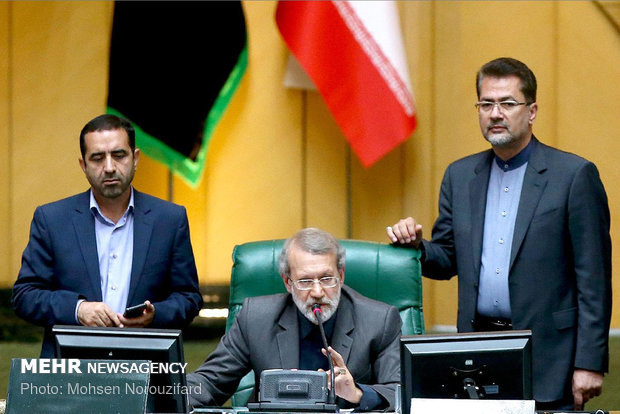Iranian lawmakers approved a bill on the country’s accession to International Convention for the Suppression of the Financing of Terrorism set by the FATF (Financial Action Task Force), after reviewing the comments of opponents and supporters on Sunday open session, MNA reported.
Reportedly, out of 276 MPs present in the meeting, a total of 143 lawmakers voted in favor of the bill while 120 voted against it. Five MPs also abstained.
The bill will now be submitted to the Guardian Council that will either suggest amendments to the text and sent it back to the lawmakers for reconsideration or pass it into law.
Parliament’s open session on Sunday morning was attended by Parliament Speaker Ali Larijani, Acting Minister of Economic Affairs and Finance Seyyed Rahmatollah Akrami, Foreign Minister Mohammad Javad Zarif, Intelligence Minister Seyyed Mahmoud Alavi, Governor of Central Bank of Iran (CBI) Abdolnaser Hemmati, Vice-President for Legal Affairs Laya Joneydi, Deputy Foreign Minister for Political Affairs Abbas Araghchi and Spokesman for the Atomic Energy Organization of Iran (AEOI) Behrouz Kamalvandi.
The session covered hearing of the comments of opponents and supporters of the bill on the Iran’s accession to Terrorist Financing Convention. Behrooz Nemati, the spokesman for presiding board of Iran’s Parliament, who was among the supporters of the bill, said the government has so far implemented 40 recommendations by FATF. He stressed that necessary measures should be taken so as not to give the enemy any excuse for misconduct, noting, “If we do not accept the convention, we have actually done nothing” in this regard.
Referring to the accession to the Convention by over 188 countries with their own terms and conditions, Nemati reiterated that joining the convention would remove any excuse and rights for enemies to meddle with our affairs.
Iranian Foreign Minister Mohammad Javad Zarif, in his speech to support the bill, said he could not give any gaurantee that approving the FATF-related bills would solve Iran’s problems, but rejecting the bills would allow US to take more measures against the country.
Mohammad Feizi, another lawmaker supporting the bill, noted that meeting international standards entails approving laws compliant with international banking regulations. Noting that accepting FATF’s rules is a step to meet the global standards on fighting terrorism, the official added, it also will be a great help to keep the channels to international financial systems open. He maintained that even China and Russia, which are Iran’s partners, have told the Islamic Republic that they could not continue their business with Iran if the country did not pass the FATF bills.
Mohammad Dehghan, who was speaking against the bill, said the recent depreciation of the Iranian rail was caused by the government’s implementation of some FATF requirements. Iranian rial has been in decline in the past weeks, plunging to the record low of 192,000 against dollar a few days ago.
The official warned that the US has targeted Iran’s economy and grasps at every means to carry on with its objectives, implicating that the FATF is one of the tools to pose further restrictions on the Iranian nation.
R.S


 Home
Home